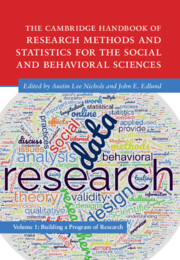 The Cambridge Handbook of Research Methods and Statistics for the Social and Behavioral Sciences
The Cambridge Handbook of Research Methods and Statistics for the Social and Behavioral Sciences from Part II - The Building Blocks of a Study
Published online by Cambridge University Press: 25 May 2023
The steps social and behavioral scientists take after the end of a study are just as important as the steps taken before and during it. The goal of this chapter is to discuss the practical and ethical considerations that should be addressed before participants leave the physical or virtual study space. We review several post-experimental techniques, including the debriefing, manipulation checks, attention checks, mitigating participant crosstalk, and probing for participant suspicion regarding the purpose of the study. Within this review, we address issues with the implementation of each post-experimental technique as well as best practices for their use, with an emphasis placed on prevention of validity threats and the importance of accurate reporting of the steps taken after the experiment ends. Finally, we emphasize the importance of continuing to develop and empirically test post-experimental practices, with suggestions for future research.
For a detailed example of a funnel debriefing procedure and the empirical test of various post-experimental practices including suspicion probing, we recommend the following article:
For further discussion of the history and progression of manipulation checks as well as specific recommendations for their use, we recommend Table 4 in the following article:
We are proponents of manipulation checks (with the proper precautions), but criticisms of manipulation checks should be seriously considered. For further reading on critiques of manipulation check practices we recommend the following article:
To save this book to your Kindle, first ensure [email protected] is added to your Approved Personal Document E-mail List under your Personal Document Settings on the Manage Your Content and Devices page of your Amazon account. Then enter the ‘name’ part of your Kindle email address below. Find out more about saving to your Kindle.
Note you can select to save to either the @free.kindle.com or @kindle.com variations. ‘@free.kindle.com’ emails are free but can only be saved to your device when it is connected to wi-fi. ‘@kindle.com’ emails can be delivered even when you are not connected to wi-fi, but note that service fees apply.
Find out more about the Kindle Personal Document Service.
To save content items to your account, please confirm that you agree to abide by our usage policies. If this is the first time you use this feature, you will be asked to authorise Cambridge Core to connect with your account. Find out more about saving content to Dropbox.
To save content items to your account, please confirm that you agree to abide by our usage policies. If this is the first time you use this feature, you will be asked to authorise Cambridge Core to connect with your account. Find out more about saving content to Google Drive.